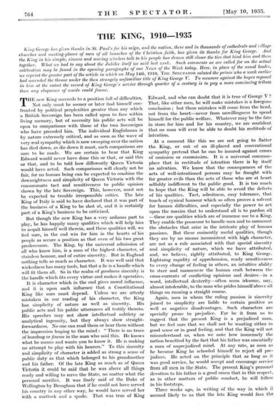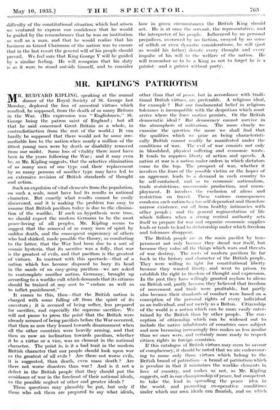TI1E KING, 1910-1935
King George has given thanks in St. Paul's for his reign, and the nation, there and in thousands of cathedrals and village churches and meeting-places of men of all branches of the Christian faith, has given its thanks for King George. And the King in his simple, sincere and moving wireless talk to his people has drawn still closer the ties that bind him and them together. What we had to say about the Jubilee itself we said last week. Such comments as are called for-on the actual celebration may be found in the opening paragraphs of our News of the Week today. Here, in place of the usual leader, we reprint the greater part of the article in which on May 14th, 1910, THE SPECTATOR saluted the prince who a week earlier had ascended the throne under the then strangely unfamiliar title of King George V. To measure against the hopes reposed in him at the outset the record • of King George's service through quarter of a century is to pay a mare convincing tribute than any eloquence of words could frame.
THE new King succeeds to a position full of difficulties. Not only must he sooner or later find himself con- fronted by political perplexities . greater than any which a British Sovereign has been called upon to face within living memory, but of necessity his public acts will, be open_ to comparisons with those of the two Sovereigns who have preceded him. The individual Englishman is by nature extremely critical, and as soon as the wave of very real sympathy which is now sweeping over the nation has died down, as die down it must, such comparisons are sure to be made. • We are certain to hear that King Edward would never have done this or that, or said this or that, and to be told how differently Queen Victoria would have acted. Such comparisons will clearly not be fair, for no human being can be expected to combine the downrightness and simplicity of Queen Victoria with the consummate tact and sensitiveness to public opinion Shown by the late Sovereign. This, however, must not be expected to trouble irresponsible critics. The late King of Italy is said to have declared that it was part of the business of a King to be shot at, and it is certainly part of a King's business to be criticized.
• But though the new King has a very arduous part to play, he has happily many qualities which will help him to acquit himself well therein, and these qualities will, we feel sure, in the end win for him in the hearts of his people as secure a position as that even of his two great predecessors. The King, by the universal admission of all who know him, is a man of the highest character, of stainless honour, and of entire sincerity. But in England nothing tells so much as character. It was well said that wickedness has many tools, but that a lie is a handle which will fit them all. So in the realm of goodness sincerity is the handle which fits every virtue and makes it operative.
It is character which in the end gives moral influence, and it is upon such influence' that a Constitutional King like ours must depend. Unless we are utterly mistaken in our reading of his character, the King has simplicity of nature as well as sincerity. His public acts and his public utterances all testify thereto. His speeches may not show intellectual subtlety or analytical ingenuity, but they always show straight- forwardness. No one can read them or hear them without the impression leaping to the mind.: "There is no trace of humbug or finesse in the man who said this. He knows what he means and wants you to know it. He is making no attempt to play with his hearers." To this sincerity and .simplicity of character is added as strong a sense of public duty as that which belonged to his grandmother and his father. Of the late King as much as of Queen Victoria it could be said that he was above all things ready and willing to serve the State, no matter what the 'personal sacrifice. It was finely said of the Duke of Wellington by Brougham that if he could not have served his country in any other way, he would have served' her with a mattock and a spade.' That was true' of King . - Edward, and who can doubt that it is true of George V? That, like other men, he will make mistakes is a foregone conclusion ; but these mistakes will come from the head, not from the heart—never from UnWillingness to spend himself for the public welfare. .Whatever may be the fate in store for him and for his country, we are confident that no man will ever be able to doubt his rectitude of intention. . _ - At a moment .like this we are not going to flatter the. King, or. out of an ill-placed and conventional sympathy pretend that he can be insured against errors of omission or conmiission. It is a universal common- place that in rectitude of intention there is by itself no salvation. We know that the consequences of the acts of well-intentioned persons may be fraught with far greater evils than the acts of those who- are at heart selfishly indifferent to the public good. It is too much to hope that the King will be able to avoid the defects of his qualities. Tact, adroitness, easy tolerance, that touch of cynical humour which so often proves a solvent for human difficulties, and especially the power to act upon the maxim that to understand all is to pardon all —these are qualities which are of immense use to a King. They enable the possessor to handle men and to surmount the obstacles that arise in the intricate play of human passions. But these eminently useful qualities, though they are by no means inconsistent with high character, are not as a rule associated with that special sincerity and simplicity of nature, which we have attributed, and, we believe, rightly attributed, to King George. Lightning rapidity of apprehension, ready sensitiveness to every change of feeling in others, an intuitive ability to steer and manoeuvre the human craft between the cross-currents of conflicting opinions and desires—in a word, intellectual dexterity—often seem irksonie; nay, almost intolerable, to the man who prides himself above all things on running a straight course.
Again, men in whom the ruling passion is sincerity joined to simplicity are liable to certain positive as well as negative disadvantages. Such characters are specially prone to prejudice. Far be it from us to suggest that the present King is a prejudiced man, but we feel sure that we shall not be wanting either in -good sense or in good feeling, and that the King will not misunderstand us, when we note bow immensely the nation benefited by the fact that his father was essentially a man of unprejudiced mind. At any rate, as soon as he became King he schooled himself to reject all pre- judices. He acted on the principle that as long as it was good service, he would accept and encourage service from all men in the State. The present King's personal devotion to his father is a good omen that in this respect, 'as in other matters of public conduct, he will follow in his footsteps.
Three weeks ago, in writing of the way in which it Seemed likely to us that the late King would face the difficulty of the constitutional situation which had arisen we ventured to express our confidence that he would be guided by the remembrance that, he was an institution as well as a man, and that he would realize that his business as Grand Chairman of the nation was to ensure that in the last resort the general will of his people should prevail. We feel sure that King George Y. will be guided by a similar feeling. He will. recognize . that his _duty is as it were to stand outside himself, and to consider how in given circumstances the British King should act. He is at once the servant, the representative, and the interpreter of his people. Influenced by no personal prejudices, overawed by no faction, swayed by no sense of selfish or even dynastic considerations, he will (just as would his father) devote every thought and every impulse of his will to the welfare of the nation. He will remember so to be a King as not to forget he is a patriot--and a patriot without party. _



































































 Previous page
Previous page